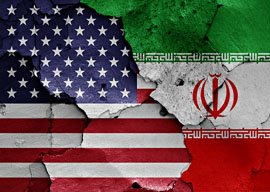
February 03, 2017

Source: Bigstock
Tillerson, of course, is on record as saying the Chinese should be blocked from visiting the half-dozen fortified islets they have built on rocks and reefs in the South China Sea.
A prediction: The Chinese will not be departing from their islands, and the Iranians will defy the U.S. threat against testing their missiles.
Wednesday’s White House statement makes a collision with Iran almost unavoidable, and a war with Iran quite possible.
Why did Trump and Flynn feel the need to do this now?
There is an awful lot already on the foreign policy plate of the new president after only two weeks, as pro-Russian rebels in Ukraine are firing artillery again, and North Korea’s nuclear missile threat, which, unlike Iran’s, is real, has yet to be addressed.
High among the reasons that many supported Trump was his understanding that George W. Bush blundered horribly in launching an unprovoked and unnecessary war on Iraq.
Along with the 15-year war in Afghanistan and our wars in Libya, Syria and Yemen, our 21st-century U.S. Mideast wars have cost us trillions of dollars and thousands of dead. And they have produced a harvest of hatred of America that was exploited by al-Qaida and ISIS to recruit jihadists to murder and massacre Westerners.
Osama’s bin Laden’s greatest achievement was not to bring down the twin towers and kill 3,000 Americans, but to goad America into plunging headlong into the Middle East, a reckless and ruinous adventure that ended her post-Cold War global primacy.
Unlike the other candidates, Trump seemed to recognize this.
It was thought he would disengage us from these wars, not rattle a saber at an Iran that is three times the size of Iraq and has as its primary weapons supplier and partner Vladimir Putin’s Russia.
When Barack Obama drew his red line against Bashar Assad’s use of chemical weapons in Syria’s civil war, and Assad appeared to cross it, Obama discovered that his countrymen wanted no part of the war that his military action might bring on.
President Obama backed down—in humiliation.
Neither the Ayatollah Khamenei nor Trump appears to be in a mood to back away, especially now that the president has made the threat public.